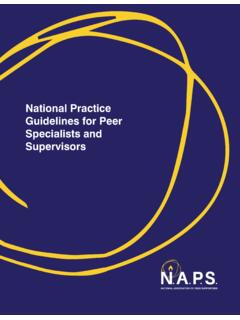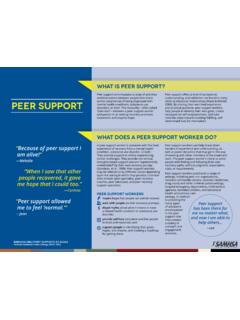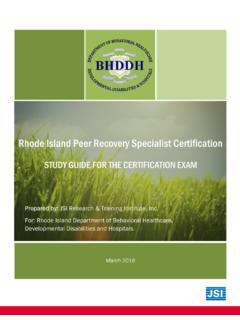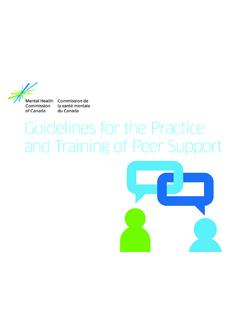Transcription of How to Start and Facilitate Support Groups for Veterans
1 How to Start and Facilitate Support Groups for Veterans Patricia Sweeney, , CPRP. New England MIRECC peer Education Center VISN 1 New England MIRECC. 1. Sponsored by: Department of Veterans Affairs Veterans Health Administration Office of Rural Health National Chaplain Center Learning Objectives Discuss steps to take when developing a Support group for Veterans in community settings. Discuss characteristics to look for when choosing the Support group facilitator(s). Discuss use of the facilitator's personal recovery story to promote conversation in the group . Discuss verbal and nonverbal behaviors that promote conversation in the Support group .
2 3. Who are peer Support providers? peer Support : peer Support occurs when people with the same problem/experience help each other. There are different kinds of peer Support -related activities, including peer Support Groups , self-help organizations (ex. Alcoholics Anonymous), and peer Support providers. peer Support Provider: A peer Support provider is caring and compassionate for what a person is experiencing. If the peer Support provider has been through similar challenges, he or she may offer ideas or wisdom gained through his or her personal experiences to inspire hope, Support personal responsibility, promote understanding, offer education, and promote self-advocacy and self-determination.
3 (International Association of peer Supporters, ). In VHA, Veterans are being hired as peer Specialists to help Veteran patients with mental illnesses and/or substance use disorders to successfully engage in their treatment through sharing life experiences, providing encouragement, and instilling a sense of hope and skill building to promote recovery. These services are provided by an appropriately qualified peer Specialist who has a specified set of expected competencies and is trained to use his or her lived experiences to help Veteran patients identify and achieve specific life goals related to recovery.
4 You are encouraged to set up a Support group for Veterans that is facilitated by individuals who share similar life experiences to the Veterans in your community. Examples of peer Support Provider Roles DO DON'T DO. Facilitate peer Support Groups Provide psychotherapy Share their own recovery stories Do other people's jobs/fulfill other people's roles in the facility Advocate for individuals that they serve Collude with individuals receiving health care services against their health Act as role models of recovery care providers Cross boundaries Provide crisis Support Support individuals in their self- Communicate with professional destructive and/or illegal behaviors health care providers when needed to assist individuals in obtaining Criticize professional health care additional Support
5 Providers in front of individuals receiving health care services Selection of group Facilitators The Support group facilitator should: Have good interpersonal skills Be dependable about scheduling and keeping meeting appointments Be relatable to the group members/have some life experiences in common with the target participants Ideally have prior experience facilitating Groups It is recommended that there be two facilitators for each Support group so that the facilitators can share responsibility for managing challenging situations that may arise in the group and also cover the facilitation of the group when one of the facilitators is absent due to illness or vacation.
6 6. Training Resources for Support group Facilitators National Alliance on Mental Illness (NAMI) Connection Recovery Support group Facilitator Training: Connection Free recovery and peer Support -related webinars: o Depression Bipolar Support Alliance (DBSA) offered monthly: webinars#partII. o International Association of peer Supporters (iNAPS) offered monthly: o SAMHSA Bringing Recovery Supports to Scale Technical Assistance Center Strategy (BRSS TACS): tacs/webinars. o SMART Recovery: 7. Planning the Support group : Questions to Answer Whattype of peer Support group do you want to organize?
7 Who are the target participants? Who will be the supervisor of the facilitator(s)? Where and when will the group occur? How will you market the peer Support group ? 8. Types of peer Support Groups Generally, there are three models for structuring a peer Support group : Curriculum-Based Topic-Focused Open Forum 9. Curriculum-Based peer Support group A curriculum-based peer Support group is highly structured and includes the following components: There are several planned topics to discuss over time. Example curricula: Vet-to-Vet: Illness Management & Recovery: Management-and-Recovery-Evidence-Based-P ractices-EBP-KIT/SMA09-4463.
8 Topics are arranged in a pre-determined order of presentation. Books, articles, and/or handouts related to the topics are handed out to read and discuss. Discussion focuses on each topic in relation to the group members' recovery and coping with life's challenges. 10. Topic-Focused peer Support group A topic-focused peer Support group can be structured in one of the following ways: group focuses discussion on recovery and coping in relation to one topic area (Ex. spirituality;. pain self-management; managing post-traumatic stress disorder; dealing with relationship challenges; life goal development; etc.)
9 Topics for discussion can be rotated based upon the interests of the group members. 11. Topic-Focused peer Support group (Continued). Here are two approaches that can be used to stimulate discussion regarding an introduced topic. Ask the group members questions or personal experiences related to the topic. Share written materials related to the topic for group members to read and discuss. Ask group members to share their opinions about the written material. Ask group members to share their personal experiences as related to the topic in the written material. 12. Open Forum peer Support group Anopen forum peer Support group does not include the structure of the other two models.
10 Usually, there is no pre-arranged agenda for the meeting. Theremay not be rules regarding attendance (Ex. Drop-in peer Support meeting). Discussion evolves based upon the interests and needs of the group members. What do you want to talk about today? . 13. Date & Location of group Determining who your target participants are will help you to decide where and when your peer Support group will occur. The schedule of the peer Support group needs to take into consideration the schedules for shuttles and public transportation accessible near the location where the group will occur. You do not want a Veteran to be stranded at the facility without a way to get home after the group meeting.






